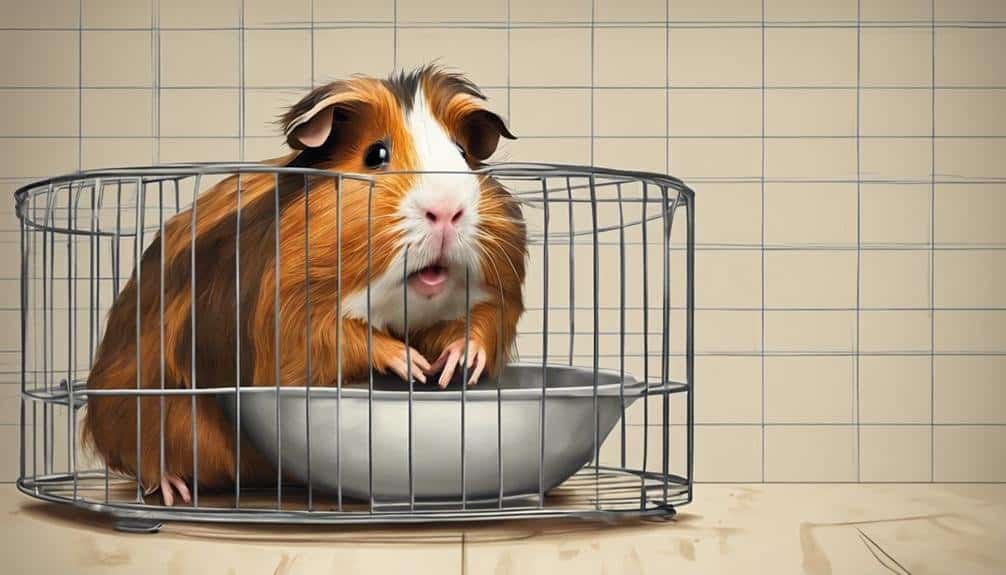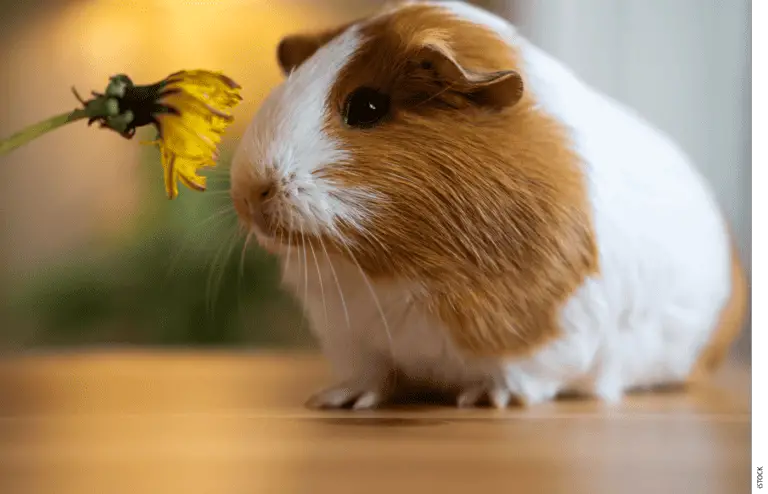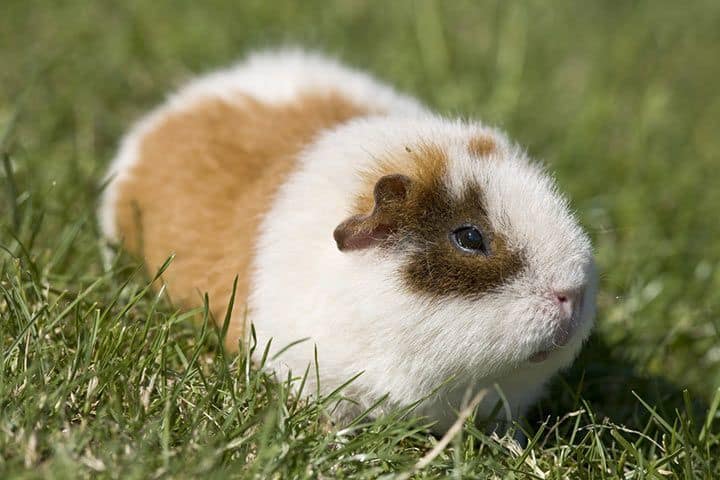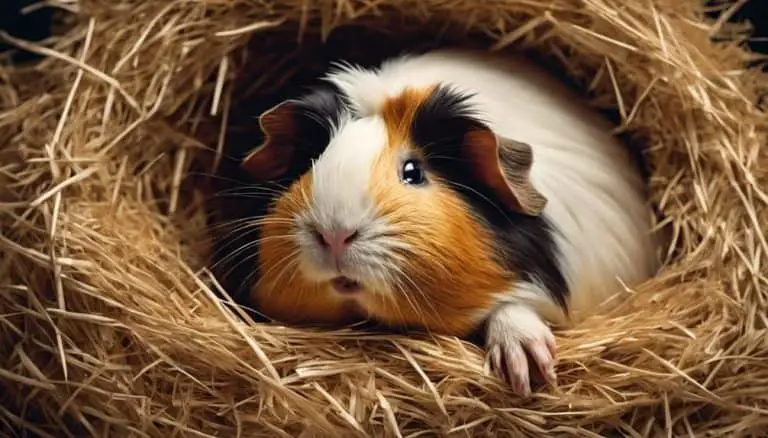How Long Can a Guinea Pig Go Without Food: A Comprehensive Guide
In pondering the plight of a pet guinea pig, one may wonder – how long can a guinea pig go without food? The answer to this query holds vital importance for every conscientious owner.
As we navigate the complexities of guinea pig care, understanding their nutritional needs and the implications of food deprivation becomes paramount.
But what if circumstances lead to an unexpected interruption in their feeding routine? Join us as we unravel the mysteries surrounding a guinea pig’s ability to sustain itself without sustenance, shedding light on the potential risks and repercussions that may ensue.
Guinea Pig Digestive System
Guinea pigs possess a finely tuned digestive system that necessitates a consistent intake of high-fiber foods to sustain their rapid metabolism and overall well-being. This specialized digestive system of guinea pigs is optimized for processing a diet high in fiber, predominantly sourced from grass, hay, and leafy greens.
Due to their rapid digestive processes, a lack of food can swiftly lead to gastrointestinal stasis, a condition where the normal movement of food through the digestive system is disrupted. To prevent such complications and maintain optimal health, guinea pigs need constant access to food.
Monitoring their food intake is crucial, as prolonged fasting can result in severe health complications related to their delicate digestive health. Therefore, ensuring a steady supply of high-fiber foods is essential for the well-being of guinea pigs, as they’re unable to withstand long periods without food without risking their gastrointestinal health.
Impact of Health on Fasting
Health conditions significantly influence a guinea pig’s ability to withstand fasting periods. Guinea pigs need a consistent intake of food to maintain their health. Without food, a guinea pig goes into a fasting state where their body starts utilizing stored nutrients for energy. However, certain health factors can impact how long a guinea pig can safely fast.
| Health Factor | Impact |
|---|---|
| Age | Young or old guinea pigs may have a harder time fasting for long hours. |
| Weight and Body Condition | Underweight or sick guinea pigs are at higher risk during fasting. |
| Water Intake | Adequate water intake is crucial to mitigate the effects of fasting. |
Factors such as gastrointestinal stasis due to lack of fiber intake, nutritional deficiencies (especially in vitamin C), and weight loss concerns can arise from prolonged fasting. It’s essential to monitor a guinea pig’s health closely during fasting periods to ensure their well-being.
Risks of Not Eating

Considering the critical impact of consistent food intake on a guinea pig’s health, it becomes imperative to address the serious risks associated with not eating for these small animals. When guinea pigs stop eating, several health risks emerge, including:
- GI Stasis: Guinea pigs are prone to gastrointestinal stasis, a condition where their digestive system slows or stops functioning, which can be life-threatening if food intake is halted for more than 6-8 hours.
- Nutritional Deficiencies: Prolonged fasting can result in nutritional deficiencies as guinea pigs require a constant supply of nutrients to maintain their health and well-being.
- Dental Problems: Lack of eating can lead to overgrown teeth or dental issues in guinea pigs, affecting their ability to chew and causing discomfort.
- Gut Motility Issues: Not eating can disrupt gut motility in guinea pigs, leading to further complications with digestion and overall health.
Immediate veterinary attention is crucial if a guinea pig stops eating to prevent these serious consequences, including weight loss and other health-related risks.
Signs of Fasting in Guinea Pigs
Upon observing a guinea pig, one may notice various signs indicating a potential fasting period, such as decreased appetite and increased lethargy. Guinea pigs have a high metabolic rate, meaning they need a constant supply of food to maintain their energy levels.
When they go without food for as little as 4-6 hours, they can start showing signs of fasting. Reduced or lack of appetite is a common indicator, along with increased lethargy where the guinea pig may seem less active than usual.
Additionally, guinea pigs may exhibit hiding behavior, seeking secluded spots in their enclosure. These signs of fasting can lead to gastrointestinal stasis, a serious condition where the digestive system slows down or stops functioning.
Monitoring your guinea pig’s food intake and behavior is essential to detect these signs early. If you notice any of these fasting signs, prompt veterinary attention is crucial to prevent potential health complications and ensure your guinea pig’s well-being.
Longevity Without Food

After observing signs of fasting in guinea pigs, understanding their longevity without food becomes crucial to prevent potential health complications. Guinea pigs can survive without food for up to 24 hours, but after 8 hours without food, they face potential health risks.
Prolonged lack of food can lead to gastrointestinal stasis, a serious and life-threatening condition where the digestive system slows down or stops completely. Immediate veterinary care is essential if a guinea pig stops eating to avoid severe consequences.
Early intervention in cases of appetite loss can help prevent the development of severe health issues in guinea pigs. Remember, guinea pigs need a consistent and balanced nutritional intake to keep their digestive system functioning properly.
If you notice any changes in your guinea pig’s eating habits or suspect they aren’t consuming food, contact a vet promptly to ensure their well-being.
Conclusion
In conclusion, it’s crucial for guinea pig owners to be vigilant about their pets’ eating habits and ensure they’re provided with a balanced diet. Prolonged fasting can have serious health implications for these small animals, leading to gastrointestinal issues and nutrient deficiencies.
By understanding the signs of fasting and seeking prompt veterinary care, owners can prevent potentially harmful consequences and ensure the well-being of their furry companions. Remember, a well-fed guinea pig is a healthy guinea pig.







